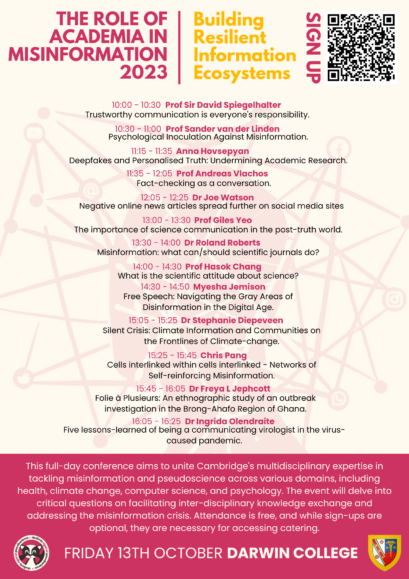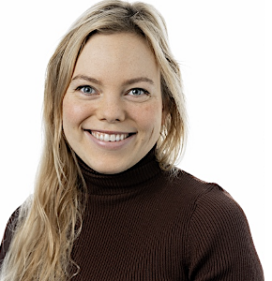
When Naomi van den Berg arrived at Darwin in 2020 to pursue a PhD in Toxicology, she found herself, inevitably, spending far more time alone than College members tend to in more typical times. But what Covid isolation cost her in terms of social interaction, she made up for by taking advantage of the forcibly imposed thinking time.
“I found myself thinking a lot about what I, as a student, could do to address my concerns around misinformation,” she says now. “The information landscape has changed drastically in the past few decades, giving rise to things like information overload, profitable algorithms that amplify misinformation online, and the growth of global communities centred on anti-science ideation.”
The impact of misinformation became clear during the pandemic, when theories about the effects of vaccines proliferated. It was in response to this that the group Students Against Pseudoscience was formed, with the ambition of bringing together those concerned about misinformation; providing a platform to explore its impact and how it spreads; and advocating for a more compassionate approach to counter a hesitancy to believe science.
“I always give the example of French President Macron’s vow to ‘piss off’ the unvaccinated,” Naomi says. “It only served to feed the ‘us-versus-them’ narrative, without acknowledging, and thus providing actual solutions to, the underlying problems leading to vaccine hesitancy.”

Naomi van den Berg
Naomi joined Students Against Pseudoscience as vice-president in 2021, and has served as co-president with Inigo Howe since 2022. The society has organised speakers and panel events, run workshops with local teachers and collaborated with initiatives such as Cambridge Zero. A forthcoming collaboration with the Cambridge Period Project, Cambridge Reproductive Rights and Cambridge Femtech will host a series of discussions to debunk misconceptions around women’s health.
This Friday, Darwin will host the society’s most ambitious project to date: a day-long conference on the role of academia in misinformation, which will bring together multidisciplinary expertise from across the University.
“There are so many fantastic, world-class researchers and initiatives working on quantifying and understanding misinformation, from the lens of Psychology to Mathematics,” Naomi explains. “Yet, due to Cambridge’s fragmented structure, many excellent initiatives and ideas often remain confined within individual departments, Colleges, faculties, research groups or centres. At this conference, we aim to collectively think about how the academic community here can enhance their response to the misinformation crisis, by for instance exploring how we can create a more centralised infrastructure that brings all concerned members as well as relevant experts together.”
Causes and priorities jostle for space in the Cambridge calendar, each with competing claims to urgency. But in Naomi’s view, these are all underpinned by the shared need to restore faith in the information being shared.
“We are living in turbulent times,” she points out. “Various global crises taint the prospect of global security, and are all fuelled by misinformation and pseudoscience. The current danger of misinformation partially derives from its exponential nature: misinformation is generated far more easily than scientific fact and travels at least six times faster on online spaces, while trust in science is becoming more polarised. Hence, as members of this University and as young people, we see cause for serious concern about the future of society and the place of science in it. Research largely relies on funding supplied by democratic governments; if the public support for science (or democracy itself) erodes further we are no longer guaranteed the freedom and resources to conduct research.”
Find out more about Friday’s conference, or book your place here.
